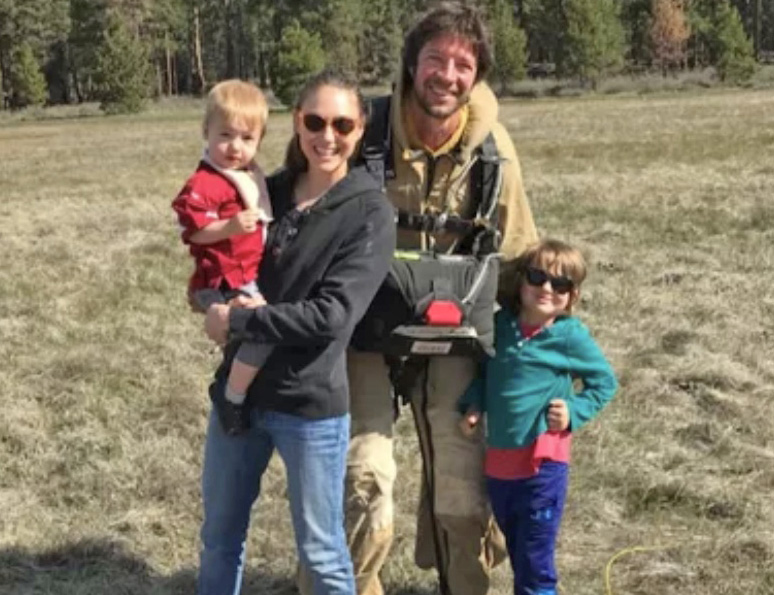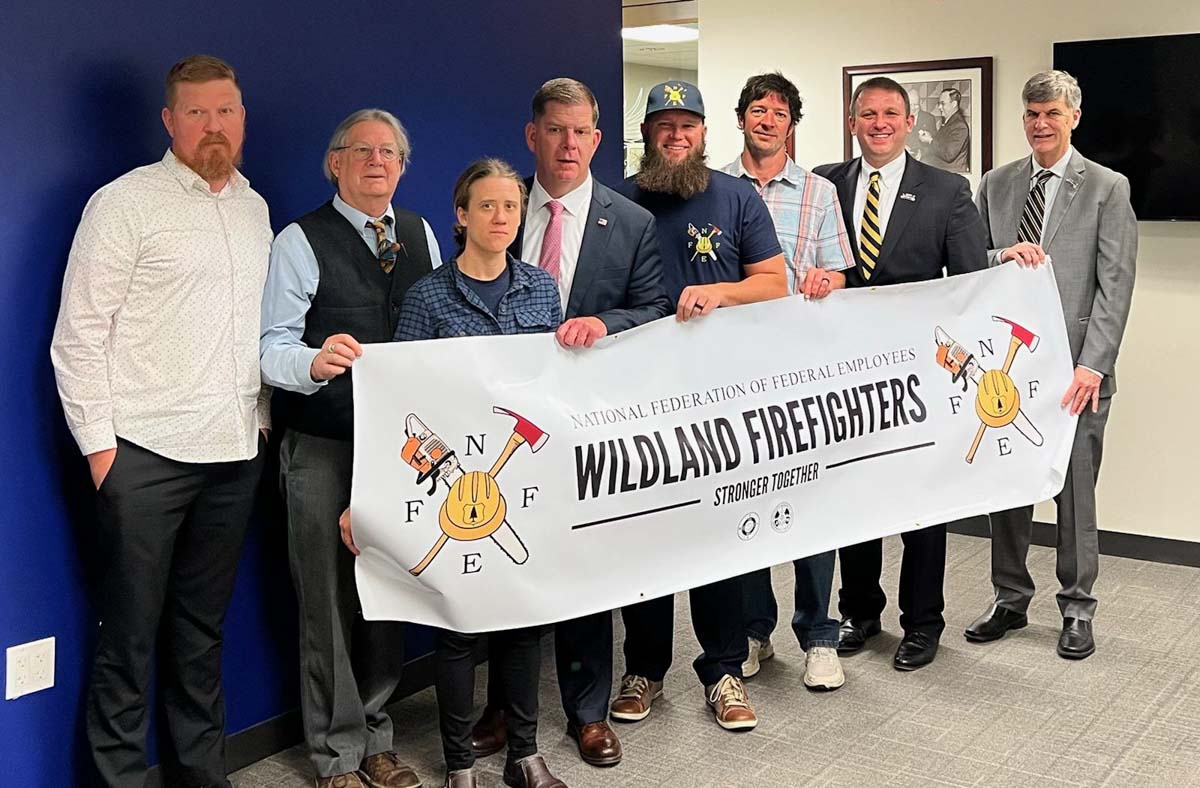
Ben Elkind was seriously injured during a training parachute jump on May 15. During his ninth year as a smokejumper (with six years before that on a hotshot crew) he sustained a dislocated hip and pelvic fracture during a hard landing. During surgery at the hospital they found six fractures and placed three plates and 10 screws to repair the damage.
While Ben is unable to fight fires for an extended length of time, he will not be able to supplement his base income with the usual 1,000 hours of overtime each year which in the past he has depended on to support his wife and two small children.
And then during a full body CT scan a nodule was discovered on his thyroid — meaning, cancer. Ben told Wildfire Today the cancer was caught early and is very treatable.
We have written about Ben previously, but that was before we were aware of the cancer. And the other reason we’re bringing it up now is that yesterday NBC News published a nearly four-minute video story about Ben and other similar examples of injured wildland firefighters.
For more than the last year Ben has been very involved working to improve the working conditions of federal wildland firefighters, being proactive in educating the public and other firefighters about what they can do to improve the pay, classification, health, well-being, and processing of worker’s compensation claims (see photo below). In 2021 he wrote an article that was published in The Oregonian and Wildfire Today. And now he finds himself as one of the examples of what can happen on the job to a wildland firefighter that can seriously affect them and their family.

There has been some progress during the last year in establishing a list of presumptive diseases for firefighters.
Pending legislation would create the presumption that firefighters who become disabled by certain serious diseases, contracted them on the job, including heart disease, lung disease, certain cancers, and other infectious diseases. The bipartisan Federal Firefighters Fairness Act, H.R. 2499, passed the House in May and is now in the Senate.
In April the Office of Workers’ Compensation Programs (OWCP), in FECA Bulletin No. 22-07, established a list of cancers and medical conditions for which the firefighter does not have to submit proof that their disease was caused by an on the job injury.
Consider telling your Senators and Representative to pass the Tim Hart Wildland Firefighter Classification and Pay Parity Act, H.R.5631. The name of the bill honors smokejumper Tim Hart who died after being injured on a fire in New Mexico in 2021. (More about the bill.) And ask your Senators to pass the Federal Firefighters Fairness Act, H.R. 2499.
You may want to make a donation to the gofundme account set up by the Redmond Smokejumper Welfare Organization to assist Ben and his family.

Ben, all the best on your recovery of both your injury and your cancer. You have given a lot of helpful information and your interview with your wife was eloquent. Putting yourself out there is really positive. I know it can feel odd to speak up. But cheers!
Michelle, so glad you are doing well! I check up on you on Facebook now and then. I’ve had you in my thoughts. Really happy the last two years went ok for you.
I had a massive adrenal tumor and kidney lesion and severe anemia. My internal med doc had never seen or heard of that kind of mass due to its size. It ended up being non-cancerous. My fire career started in”94 and I fully suspect it was related to toxic exposure on the job. Ben, you brought up that your cancer was secondarily found, it’s a good thought for people to get those odd ailments or aches checked out. In my case, if you think you’re just putting on belly weight, feeling extra tired, and are frequently asked when you’re due (and you’re pretty sure it’s not “that”) maybe get an MRI?
KKBtoG thank you for your kindness. I am much better these days 🙂 Glad your situation was benign.
Happy to hear your cancer was found early. Mine was not. Stage 4 non-hodgkins lymphoma which required too many treatments to count, including an allogenic stem cell transplant. 19 years on the job and my case has been denied twice. Hopefully 3rd time is the charm. Good luck in your treatment.
Michelle, hoping for the best for you and a good outcome. I filed a CA-2 and cited this memo from DOL: https://www.dol.gov/sites/dolgov/files/OWCP/feca/OWCPFactSheet-FECABulletinNo22-07.pdf
Anther helpful page:
https://www.dol.gov/agencies/owcp/FECA/FederalFirefighterclaims
I also had to attach a master record with my claim to show fire experience. My doctor’s report also had two key points: that I had never regularly smoked/chewed tobacco, and I had no family history of cancer.
After everything was submitted it took about 5 weeks for the regional medical director for OWCP to accept the claim.
I’m sure you already know all of this, but thought it may be helpful to post for others. Wishing you the best.
Thank you for the information Ben. It’s a hard process to get through when there is nobody who really understands the process. I had everything loaded into esafety and not ECOMP. I do expect to have my case approved this time.
Michelle
Ben, you are a king among men. I wouldn’t want to have anyone else representing our voice as Wildland Firefighters. The most encouraging thing I’ve heard, in a long time, that the DOL accepted your claim with such ease!
Let us know if you ever need anything,
VBH
I would like to say that I don’t need any donations. I’m incredibly grateful to everyone that helped me out when I was injured, and that helped take the financial pressure off of me for this season. It was really incredible to see all the support from the fire community and especially everyone at the jump base.
NBC called me about the interview, and the reason I said yes to this was because I’m concerned about all my friends out there working in smoke and other hazards who may have cancer, undetected, like I did. I was also happy that both Michelle Hart and my wife were able to speak about these issues. We don’t hear from firefighter partners enough.
The USFS does not have a “surveillance” medical program for their employees. The only medical program currently is a “Fitness For Duty” program, known as eMedical and that’s the annual physical we can take.
When I asked why we don’t have a surveillance program I was told that it is because the USFS has not determined if cancer is caused by wildfire smoke or other exposures we face at work. There are some ongoing studies that may lead to the USFS making a determination whether smoke causes cancer or not, but nothing will be done in the next 5 years.
What detected my thyroid nodule was a CT Scan, and that exposes you to about 150 X-Rays worth of radiation. So it may not be a great solution. Proper surveillance would most likely consist of yearly lung capacity tests (Spyrometry), Hearing tests (Audiology) and a Chest X-Ray that could be done every 3 years or so. That’s the likely outcome if the USFS decides that smoke causes cancer and begins a medical surveillance program, but it still wouldn’t have caught a thyroid nodule.
I’m lucky that mine was caught. It really isn’t a big deal and I’m hesitant to even say I have cancer when I will have a small surgery to remove half my thyroid and hopefully just move on with my life. Others have had it much worse.
I’m happy to let everyone know that DOL accepted my claim and determined that the cancer was related to my work as a wildland firefighter. Meeting with DOL Secretary Marty Walsh back in DC is something that I was lucky to be a part of and now I’m directly benefiting from it.
Thanks to everyone for all the support.